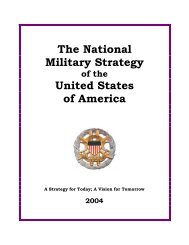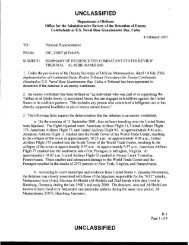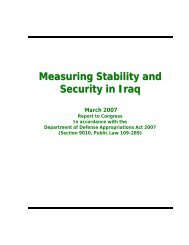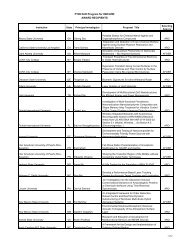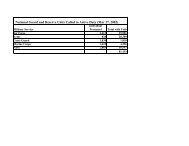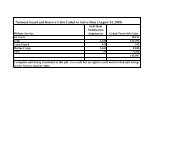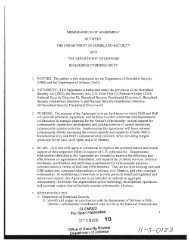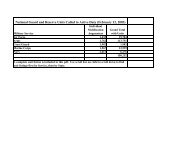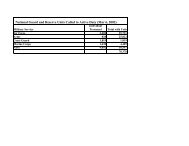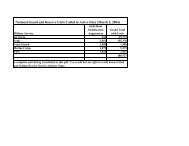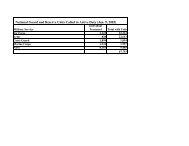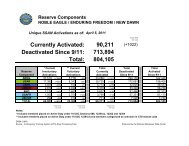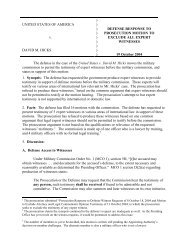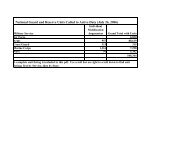Report - United States Department of Defense
Report - United States Department of Defense
Report - United States Department of Defense
Create successful ePaper yourself
Turn your PDF publications into a flip-book with our unique Google optimized e-Paper software.
UNCLASSIFIED<br />
Since the first post-2001 Parliament was elected in 2005, the Wolesi Jirga 33 has become<br />
increasingly confident in its legislative role, as well as in its function to scrutinize the<br />
government. General sessions <strong>of</strong> the Wolesi Jirga <strong>of</strong>ten entail heated discussions. The quota for<br />
women has helped increase the role <strong>of</strong> Afghan women in decision and legislation making. There<br />
are over 27 female Members <strong>of</strong> Parliament (MPs).<br />
Parliamentary groups can be broadly divided into three groups: pro-government; political<br />
opposition; and independents. Political parties are represented in Parliament, but not in<br />
sufficient numbers to command a majority block. As a result, a significant number <strong>of</strong><br />
independent MPs, coalitions, and groupings are common. Coalitions within Parliament are not<br />
stable, and their size tends to increase and decrease sporadically.<br />
President Karzai’s administration has strong support in the current Parliament, elected in<br />
September 2010, and is <strong>of</strong>ten able to rally majority votes behind new legislation. Although<br />
President Karzai has an informal support base composed <strong>of</strong> a number <strong>of</strong> Parliamentary groups,<br />
he sometimes has to rely on the support <strong>of</strong> Parliamentary groups aligned to his First Vice<br />
President, Mohammed Fahim Khan, and Second Vice President, Karim Khalili. Although<br />
President Karzai currently has adequate support from coalitions in Parliament to push through<br />
legislation on certain issues, these coalitions also occasionally vote against executive branch<br />
initiatives. There is no formal role for political parties in the Wolesi Jirga, making it a fluid and<br />
dynamic legislative body. Given that no single party dominates the Lower House, voting<br />
patterns can be difficult to predict and voting outcomes <strong>of</strong>ten depend on the issue at hand.<br />
Unfortunately, the current political culture in both the Wolesi Jirga and the Meshrano Jirga is<br />
<strong>of</strong>ten dominated by intimidation and corruption, and the purchasing <strong>of</strong> votes is common practice.<br />
Although the issue <strong>of</strong> corruption remains a challenge across Afghanistan, the Parliament<br />
continues to evolve and mature into a stronger oversight body which holds the other branches <strong>of</strong><br />
government to account.<br />
Parliament’s legislative agenda for the spring will address important draft legislation, including<br />
the Electoral Law and the Independent Election Commission Structure Law. Bills recommended<br />
to the Meshrano Jirga by the Wolesi Jirga are almost always ratified by the Upper House.<br />
However, President Karzai has strong support in the Meshrano Jirga and is able to use the Upper<br />
House in certain cases where he is not content with changes made to bills by the Lower House.<br />
For example, the Wolesi Jirga amended the IEC Structural Law and referred the same to the<br />
Meshrano Jirga in 2012. Karzai was not content with the amendments and was able to rally<br />
support in the Meshrano Jirga to reject the bill which was subsequently referred back to the<br />
Wolesi Jirga. Upon reconvening in March 2013, a conference committee between the Wolesi<br />
Jirga and the Meshrano Jirga will work to resolve differences in their two versions <strong>of</strong> the IEC<br />
Structural Law.<br />
USAID continues to assist Parliament members in both upper and lower houses, parliament staff,<br />
leadership <strong>of</strong>fices, and committees. In addition to institutional development, the USAID-funded<br />
Afghanistan Parliamentary Assistance Project (APAP) activities improve Parliament’s<br />
constituency outreach efforts, communications, information technology use, and legislative<br />
reform and national budget review. USAID assistance strengthens the ability <strong>of</strong> the Parliament<br />
33 The Wolesi Jirga is the lower house <strong>of</strong> the National Assembly <strong>of</strong> Afghanistan. The Meshrano Jirga is the upper house.<br />
141



